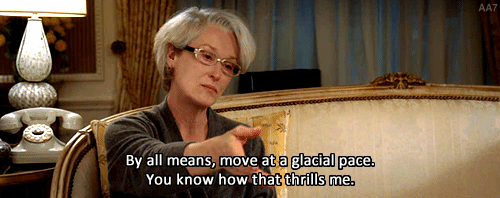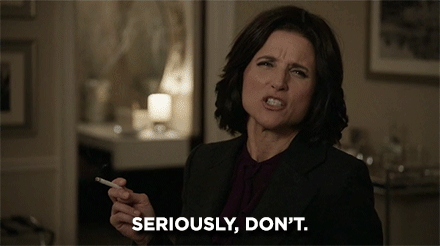You want to jump for joy and barf at the same time. So close to the dotted line, you can practically feel your bank account getting heavier. That’s right, you landed the interview, AKA the worst part of the job hunt. Sending a resume and cover letter off into cyberspace seems much less intense than talking face-to-face with someone while wearing uncomfortable clothes. Let these tips be your guide to mastering your fear and giving you the confidence you need to slay your next interview.
1. Practice

Before the interview, find out if your career center offers mock interviews. If not, ask your friends to role play and act the part of interviewer. Think of it as a dress rehearsal. This will help you feel less nervous and more prepared when the real deal comes along because you’ll already have a general idea of what you want to say. Some schools offer mock interviews with academic advisors or even let students practice in front of dogs.
2. Do your research

Just as your interviewer likely read through your resume before the interview, read up on the organization. Director of Media Entrepreneurship and Special Programs at American University’s School of Communication and Professor Amy Eisman recommended Google Alerts to stay on top of news regarding the organization. Make sure you know exactly what the organization does so that you know exactly which of your skills to highlight. If the position you applied for specifically asks for someone who knows HTML, you’ll know to bring up your coding languages during the interview.
3. Be punctual

Plan to arrive at your interview at least 10 minutes early. You don’t want to risk arriving late and creating a bad first impression. The extra 10 minutes will also give you time to collect your thoughts before the interview so that you don’t feel nauseous and panicky as you try to answer the interviewer’s questions.
4. Keep your Resume at the Ready

Even if you already sent your interviewer your resume and cover letter, make sure you bring another copy. You might even want to bring two or three copies in case more than one person interviews you. It can also come in handy to have your resume to glance at if your mind suddenly goes blank.
5. Make Eye Contact

Make sure you maintain good eye contact with your interviewer, even though this seems like a tall order when you’re nervous. You don’t want to appear too timid, but you also don’t need to stare into their eyes the whole time (don’t come off like a creep). Look up now and then to make sure your interviewer is on the same wavelength. If the idea of eye contact seriously freaks you out, stare at your interviewer’s eyebrows. Nobody can tell the difference.
6. Come up with a question

When your interviewer asks at the end, “Do you have any questions?” ask something, whether or not you actually know the answer. Knowing ahead of time that this question almost always comes up will give you a chance to prepare. “When will I find out if I got the job?” is a decent stock question to have on hand. You can also ask about what their work environment feels like if the interviewer doesn’t mention that earlier.
7. Give examples

Your interviewer will make sure to ask you a question regarding your leadership abilities, past projects or ability to work with a team. Eisman recommended giving specific examples for these questions. “If your interviewer asks you about your ability to collaborate, share a story in which you worked with a team,” she said. Not only do these examples give more information about your skills, but they also make you more memorable to the interviewer.
8. Channel JFK

Remember when JFK said, “Ask not what your country can do for you, but what you can do for your country”? Approach your potential job the same way. “Don’t approach the job about what they can do for you—talk about what you can do for them,” said Eisman. Employers don’t particularly care about boosting your portfolio; they want employees and interns who will benefit their organization. For example, emphasize how your photography skills can revamp the company’s website instead of saying, “I want to get better at photography.”
9. Get pumped

No one wants an apathetic employee. Even though “be enthusiastic” sounds cliché, it’s something you’re likely to forget if you’re worried about blanking on where you went to school. Thinking, “Here’s my opportunity to talk to someone who’s just as passionate about the environment as I am,” will help you much more than, “Here’s my chance to embarrass myself in front of a potential boss.”
10. Never assume

If a potential employer calls you for an interview (or even a second interview), you’ll probably feel excited, but you still need to keep it in perspective. “Don’t make the mistake of thinking you have a job just because you are being interviewed,” said Eisman. If they haven’t explicitly said that you have the job, don’t cancel other interviews or sign a lease for an apartment just yet. You can celebrate after they tell you the good news.



















